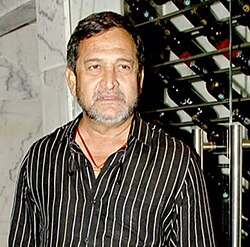| V. Shantaram Lifetime Achievement Award | |
|---|---|
 The 2024 recipient: Mahesh Manjrekar | |
| Awarded for | "Outstanding contribution to the growth and development of Marathi cinema" |
| Location | Maharashtra |
| Country | India |
| Presented by | Government of Maharashtra |
| Rewards |
|
| First award | 1994 |
| Final award | 2024 |
| Recent winner | Mahesh Manjrekar |
| Highlights | |
| Total awarded | 32 |
| First winner | Chandrakant Mandare |
The V. Shantaram Lifetime Achievement Award is a lifetime achievement honor presented annually by the Government of Maharashtra, India. Established in 1994, the award is given by the Department of Cultural Affairs to individuals in recognition of their long-standing contributions to Marathi cinema. Recipients are selected by a committee comprising members from the Indian film industry.
Contents
The award includes a silver medal, a certificate, a trophy, and a cash prize of ₹10,00,000. [1]
It was instituted to commemorate filmmaker V. Shantaram (1901–1990), who played a notable role in the development of Indian cinema.
The first recipient was actor Chandrakant Mandare, awarded in 1994 at the Maharashtra State Film Awards. As of 2023, a total of 32 individuals have received the award. Among those, Ravindra Mahajani is the only posthumous recipient. Mahajani's actor son, Gashmeer Mahajani accepted the award on his behalf at the 57th Maharashtra State Film Awards ceremony. [2] The most recent recipient of the award is veteran actor and filmmaker Mahesh Manjrekar who was honoured at 61st Maharashtra State Film Awards. [3]
















